Book chapters and peer-reviewed scholarly articles. See here for my popular level writings.
BOOK CHAPTERS
- “Eat, Drink, and Be Sober: The Case for Drug Prohibition” in Steven Cowan (ed), Problems in Applied Ethics (Bloomsbury, forthcoming)
- “Guns on Campus: A Defense” (with Kyle Blanchette) in Bob Fischer (ed), College Ethics: A Reader on Moral Issues that Affect You 2nd ed (Oxford University Press, 2020).
- “Human Lives Matter: Reflections on Human Exceptionalism” in Paul Copan and Wes Jamison (eds), What Would Jesus Really Eat? The Biblical Case for Eating Meat (Castle Quay, 2019)
- “There is Nothing Wrong with Eating Meat” in Paul Copan and Wes Jamison (eds), What Would Jesus Really Eat? The Biblical Case for Eating Animals (Castle Quay, 2019)
- “The Moral Case for Gun Ownership” in Bob Fischer (ed), Ethics, Left and Right: The Moral Issues that Divide Us (Oxford University Press: 2019)
SCHOLARLY ARTICLES
 “Jesus, Guns, and Luke 22:36: A Response to Barrigar” Evangelical Quarterly 95:3 (2024)
“Jesus, Guns, and Luke 22:36: A Response to Barrigar” Evangelical Quarterly 95:3 (2024)
In a recent article, Chris Barrigar has argued that my theological and philosophical case for gun ownership fails. This article critiques Barrigar’s response. I argue that Barrigar’s critique fails because it (a) incorrectly situates my arguments in a libertarian context, (b) inadequately engages with my exegetical arguments, (c) misunderstands and thus fails to engage with the relevant philosophical arguments, (d) ignores my existing work addressing some of his objections, and (e) misinterprets the relevant empirical evidence.
“Did American Police Originate from Slave Patrols?” Academic Questions 36:3 (2023)
 ABSTRACT: American policing did not originate from slave patrols. This widespread pernicious myth falsely asserts a causal relationship between slave patrols and policing and intimates that modern policing carries on a legacy of gross injustice. There is no evidence for either postulate.
ABSTRACT: American policing did not originate from slave patrols. This widespread pernicious myth falsely asserts a causal relationship between slave patrols and policing and intimates that modern policing carries on a legacy of gross injustice. There is no evidence for either postulate.
“A Simple Argument for Respecting Conscience” The National Catholic Bioethics Quarterly 23:2 (2023)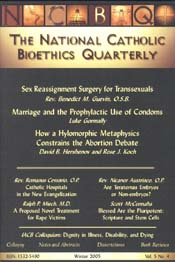
ABSTRACT: Conscience is widely misunderstood. For many, conscientious objection, both religious and non-religious, is regarded as nothing more than just a convenient excuse to get around the rules. This essay provides a clear, accessible, and simple argument for seriously respecting conscience. I show how the conscience is an integral part of responsible decision-making and must be recognized and protected. I end with an application of the right of conscience to recent debates over mandatory COVID-19 vaccination. The goal of this essay is not to settle debates over conscientious objection, nor is it to establish conscience as an ultima facie right, but rather to show why there is a strong case for taking conscience seriously in ethics and public policy.
 “The Lived Experience Fallacy” Academic Questions 35:2 (2022)
“The Lived Experience Fallacy” Academic Questions 35:2 (2022)
ABSTRACT: Lived experiences are often vividly used by woke activists as evidence of widespread injustice, accompanied with a call for action and social change. Yet basing one’s entire case for widespread injustice and sweeping social change on lived experiences is, quite simply, bad statistical reasoning.
 “If Homosexuality is Wrong, So is Contraception” Philosophia Christi 24:1 (2022)
“If Homosexuality is Wrong, So is Contraception” Philosophia Christi 24:1 (2022)
ABSTRACT: Historically, the Christian church was united in firm opposition to both homosexuality and contraception. Today most evangelical Christians continue to oppose the former but have embraced the latter. This paper argues that there is a clear tension between these views, especially when it comes to the evangelical use of natural law-type reasoning. The conclusion of this paper is that Christians who view homosexual activity as immoral must also view artificial contraception in the same light. They are wrong for the same reason: they both misuse the sexual organs by directing sexual activity away from procreative unity.
“Does Jesus Endorse Armed Self-Defense in Luke 22:36?” Evangelical Quarterly 92:4 (2021)
 ABSTRACT: In Luke 22:36, Jesus instructs his disciples to buy swords. The best understanding this passage is that Jesus is endorsing the carrying of weapons for personal protection. This paper outlines the self-defense interpretation and defends it against several objections. I then argue that the injunction to buy a sword can be extended to gun ownership as a modern-day application. After making the scriptural case for gun ownership, I then sketch a brief philosophical argument for a strong moral right to gun ownership. Various theological, philosophical, and empirical objections are considered and found lacking.
ABSTRACT: In Luke 22:36, Jesus instructs his disciples to buy swords. The best understanding this passage is that Jesus is endorsing the carrying of weapons for personal protection. This paper outlines the self-defense interpretation and defends it against several objections. I then argue that the injunction to buy a sword can be extended to gun ownership as a modern-day application. After making the scriptural case for gun ownership, I then sketch a brief philosophical argument for a strong moral right to gun ownership. Various theological, philosophical, and empirical objections are considered and found lacking.
“The Contingency Argument in Plain Language” The Heythrop Journal (forthcoming)
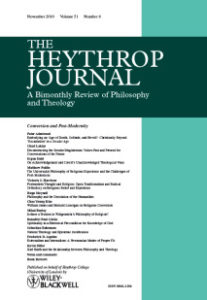 ABSTRACT: In this article we sketch and defend a version of Aquinas’s contingency argument in plain language. We avoid using some of the metaphysical jargon that typically accompanies discussions of the contingency argument. Eschewing this jargon allows its strength to resonate better with general audiences.
ABSTRACT: In this article we sketch and defend a version of Aquinas’s contingency argument in plain language. We avoid using some of the metaphysical jargon that typically accompanies discussions of the contingency argument. Eschewing this jargon allows its strength to resonate better with general audiences.
The argument we defend here incorporates insights from recent defenses of the contingency argument. Over the last two decades there has been a strong resurgence of interest (both philosophical and apologetic) in developing analytically rigorous Thomistic-style cosmological arguments. We build on these philosophical developments by offering a novel argument against the doctrine of existential inertia, and on the apologetic project by framing the contingency argument in a more lay-accessible format.
“Praise the Lord and Pass the Ammunition“ Syndicate Philosophy (2020) – Part of a book symposium on Michael Austin’s God and Guns in America
There is much to digest in Michael Austin’s God and Guns in America. Austin carefully considers arguments made by those in defense of gun ownership and those critical of it. Although he finds merit in both sides, he ultimately concludes that the “status quo with respect to guns in America is unsustainable and unacceptable.” (xvi)
I respectfully disagree. In what follows I will outline several problems with Austin’s arguments. These are divided into philosophical problems, empirical problems, and exegetical problems. My criticisms aren’t limited to the ones listed here, but space considerations preclude a detailed analysis.
“In Defense of Spanking” Think: Philosophy for Everyone 19:54 (2020): 49-54
 Opponents of spanking rest their arguments on the implicit assumption that punishment can only be justified by its corrective or deterrent effects. But this is a questionable assumption. Punishment is fundamentally about retribution: it seeks to give a wrongdoer what he deserves. It is for this reason that corporal punishment is morally permissible, irrespective of whether it corrects or deters future misbehavior.
Opponents of spanking rest their arguments on the implicit assumption that punishment can only be justified by its corrective or deterrent effects. But this is a questionable assumption. Punishment is fundamentally about retribution: it seeks to give a wrongdoer what he deserves. It is for this reason that corporal punishment is morally permissible, irrespective of whether it corrects or deters future misbehavior.
“A Moral Defense of Trophy Hunting” Sport, Ethics, and Philosophy 14:1 (2020): 26-34
 This paper defends the morality of hunting for sport, also known as recreational or trophy hunting. Using an argument from analogy, I argue that there is no morally relevant difference between trophy hunting and another activity that most of us regard as uncontroversial. Since the latter is morally permissible, so is trophy hunting. Several disanalogies are examined and found irrelevant.
This paper defends the morality of hunting for sport, also known as recreational or trophy hunting. Using an argument from analogy, I argue that there is no morally relevant difference between trophy hunting and another activity that most of us regard as uncontroversial. Since the latter is morally permissible, so is trophy hunting. Several disanalogies are examined and found irrelevant.
“How to Think About the Gun Control Debate” Think: Philosophy for Everyone 18:52 (2019): 21-29
 Many on both sides of the gun control debate are under the impression that the best way to settle it is by weighing outcomes in the context of a utilitarian cost-benefit analysis. This paper suggests that this way of thinking about the gun control debate is fundamentally mistaken. What matters is not the risk (or lack thereof) that guns pose to society, but simply whether guns are a reasonable means of self-defense when used to resist crimes. What this means is that even if we were to grant the claim that gun ownership decreases average safety, it wouldn’t follow that restrictive gun control measures would be justified.
Many on both sides of the gun control debate are under the impression that the best way to settle it is by weighing outcomes in the context of a utilitarian cost-benefit analysis. This paper suggests that this way of thinking about the gun control debate is fundamentally mistaken. What matters is not the risk (or lack thereof) that guns pose to society, but simply whether guns are a reasonable means of self-defense when used to resist crimes. What this means is that even if we were to grant the claim that gun ownership decreases average safety, it wouldn’t follow that restrictive gun control measures would be justified.
“The Case for Marijuana Prohibition” Ethics & Medicine 35:1 (2019): 17-25
 The state has an interest in protecting the ability of its citizens to act freely in pursuit of the good life. Psychoactive drugs that negatively affect one’s cognitive capacities conflict with this goal by undermining the conditions needed for free action. Accordingly, the state has an interest in legally prohibiting certain classes of drugs, including marijuana and other cognition-disrupting substances.
The state has an interest in protecting the ability of its citizens to act freely in pursuit of the good life. Psychoactive drugs that negatively affect one’s cognitive capacities conflict with this goal by undermining the conditions needed for free action. Accordingly, the state has an interest in legally prohibiting certain classes of drugs, including marijuana and other cognition-disrupting substances.
“The Moral Case for Concealed Carry on Campus” Academic Questions 31:4 (2018): 466-471
 I am an ethics professor, and I carry a concealed handgun in the classroom. In the event of a mass shooting, I am the first line of defense between my students and an attacker, and I refuse to let myself and my students be victims.
I am an ethics professor, and I carry a concealed handgun in the classroom. In the event of a mass shooting, I am the first line of defense between my students and an attacker, and I refuse to let myself and my students be victims.
I’m sure that many of my fellow professors would disagree with my actions. In fact, many would probably brand me as a traitor to academia for admitting such a thing. For them, it is inconceivable how a member of the intelligentsia—and especially an ethics professor of all people—could support the right to carry a so-called instrument of death. So in what follows, let me make the moral case for campus carry.
“You Are Not Your Own: A Critique of Liberal Social Ethics” Evangelical Philosophical Society Web Project on Philosophical Anthropology (2018)
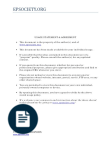 Appeals to consent, autonomy, and self-ownership form the basis of much of contemporary liberal and libertarian social ethics. Call these individualist theories of social ethics. The plausibility of individualist theories, I shall argue, depends upon a number of background metaphysical commitments that are often left unstated and undefended. These commitments and their problems are the chief subject of this paper.
Appeals to consent, autonomy, and self-ownership form the basis of much of contemporary liberal and libertarian social ethics. Call these individualist theories of social ethics. The plausibility of individualist theories, I shall argue, depends upon a number of background metaphysical commitments that are often left unstated and undefended. These commitments and their problems are the chief subject of this paper.
“Why Recreational Drug Use is Immoral” The National Catholic Bioethics Quarterly 17:4 (2017): 605-614

This paper argues for two claims. First, recreational drug use is immoral because it undermines cognitive functioning. Second, for similar reasons, the state has a prima facie public policy interest in enacting legal restrictions on recreational drug use. In this context, “recreational drug use” refers to activities in which a person uses some intoxicating substance to impair, destroy, or otherwise frustrate the functioning of his cognitive faculties for the sake of pleasure or enjoyment.
“The Perverted Faculty Argument” Philosophia Christi 19:1 (2017): 207-216
 There is an old argument rooted in the classical natural law tradition that says that the “perverse” or “unnatural” use of a human faculty is immoral. This short essay offers a derivation, overview, and brief defense of this “perverted faculty” argument (PFA). I shall argue that the PFA is entailed by some commonsense theses about the nature of goodness.
There is an old argument rooted in the classical natural law tradition that says that the “perverse” or “unnatural” use of a human faculty is immoral. This short essay offers a derivation, overview, and brief defense of this “perverted faculty” argument (PFA). I shall argue that the PFA is entailed by some commonsense theses about the nature of goodness.
“Industrial Farming is Not Cruel to Animals” Journal of Agricultural and Environmental Ethics 30:1 (2017): 37-54
 ABSTRACT: Critics of industrial animal agriculture (also known as “factory” farming) have argued that its practices are cruel, inhumane, or otherwise degrading to animals. These arguments sometimes form the basis of a larger case for the complete abolition of animal agriculture, while others argue for more modest welfare-based reforms that allow for certain types of industrial farming. This paper defends industrial farming against the charge of cruelty. As upsetting as certain practices may seem, I argue that they need not be construed as cruel or inhumane. Any link between industrial farming and cruelty or inhumanity is contingent on certain cultural, behavioral, and psychological facts that are person-dependent. For many people working in animal agriculture, these facts do not obtain. To be sure, industrial animal agriculture has real moral hazards that must be carefully avoided, but all that this shows is that working with animals is not for everyone.
ABSTRACT: Critics of industrial animal agriculture (also known as “factory” farming) have argued that its practices are cruel, inhumane, or otherwise degrading to animals. These arguments sometimes form the basis of a larger case for the complete abolition of animal agriculture, while others argue for more modest welfare-based reforms that allow for certain types of industrial farming. This paper defends industrial farming against the charge of cruelty. As upsetting as certain practices may seem, I argue that they need not be construed as cruel or inhumane. Any link between industrial farming and cruelty or inhumanity is contingent on certain cultural, behavioral, and psychological facts that are person-dependent. For many people working in animal agriculture, these facts do not obtain. To be sure, industrial animal agriculture has real moral hazards that must be carefully avoided, but all that this shows is that working with animals is not for everyone.
“The Ethics of ‘Gun-Free Zones’“ Philosophia 45:2 (2017): 659-676
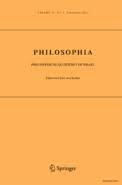 ABSTRACT: I argue that location-specific gun bans (commonly known as “gun-free zones”) are typically unjust. If there is a right to carry firearms outside of one’s home, then the state cannot prohibit gun owners from carrying their firearms into certain areas without assuming a special duty of protecting those whom it coercively disarms. This task is practically impossible in most of the areas where guns are commonly banned. Gun owners should therefore be allowed to carry their guns in most public places, including college campuses.
ABSTRACT: I argue that location-specific gun bans (commonly known as “gun-free zones”) are typically unjust. If there is a right to carry firearms outside of one’s home, then the state cannot prohibit gun owners from carrying their firearms into certain areas without assuming a special duty of protecting those whom it coercively disarms. This task is practically impossible in most of the areas where guns are commonly banned. Gun owners should therefore be allowed to carry their guns in most public places, including college campuses.
“Against Moderate Gun Control“ coauthored with C’Zar Bernstein, Libertarian Papers 8:2 (2016): 308-325
 ABSTRACT: Arguments for handgun ownership typically appeal to handguns’ value as an effective means of self-protection. Against this, critics argue that private ownership of handguns leads to more social harm than it prevents. Both sides make powerful arguments, and in the absence of a reasonable consensus regarding the merits of gun ownership, David DeGrazia proposes two gun control policies that ‘reasonable disputants on both sides of the issue have principled reasons to accept.’ These policies hinge on his claim that ‘an even-handed examination of the available evidence casts considerable doubt on the thesis that handgun ownership enables more adequate self-defense and physical security in the home.’ We challenge DeGrazia’s ‘moderate gun control’ policies on both philosophical and empirical grounds. Philosophically, we show that the arguments he gives in support of his proposed gun-control measures are too narrow and incomplete to warrant his conclusions about what kind of gun control there ought to be, even if he is right about the empirical evidence. Empirically, we argue that a truly even-handed examination of the evidence makes DeGrazia’s claim that gun ownership is on average self-defeating much less plausible than he supposes. Our conclusion is that DeGrazia has failed to establish his claim that gun ownership is self-defeating and therefore has no case for the gun-control policies he suggests.
ABSTRACT: Arguments for handgun ownership typically appeal to handguns’ value as an effective means of self-protection. Against this, critics argue that private ownership of handguns leads to more social harm than it prevents. Both sides make powerful arguments, and in the absence of a reasonable consensus regarding the merits of gun ownership, David DeGrazia proposes two gun control policies that ‘reasonable disputants on both sides of the issue have principled reasons to accept.’ These policies hinge on his claim that ‘an even-handed examination of the available evidence casts considerable doubt on the thesis that handgun ownership enables more adequate self-defense and physical security in the home.’ We challenge DeGrazia’s ‘moderate gun control’ policies on both philosophical and empirical grounds. Philosophically, we show that the arguments he gives in support of his proposed gun-control measures are too narrow and incomplete to warrant his conclusions about what kind of gun control there ought to be, even if he is right about the empirical evidence. Empirically, we argue that a truly even-handed examination of the evidence makes DeGrazia’s claim that gun ownership is on average self-defeating much less plausible than he supposes. Our conclusion is that DeGrazia has failed to establish his claim that gun ownership is self-defeating and therefore has no case for the gun-control policies he suggests.“Consenting Adults, Sex, and Natural Law Theory” Philosophia 44:2 (2016): 509-529
 ABSTRACT: This paper argues for the superiority of natural law theory over consent-based approaches to sexual morality. I begin by criticizing the “consenting adults” sexual ethic that is dominant in contemporary Western culture. I then argue that natural law theory provides a better account of sexual morality. In particular, I will defend the “perverted faculty argument” (PFA), which holds that it is immoral to use one’s bodily faculties contrary to their proper end.
ABSTRACT: This paper argues for the superiority of natural law theory over consent-based approaches to sexual morality. I begin by criticizing the “consenting adults” sexual ethic that is dominant in contemporary Western culture. I then argue that natural law theory provides a better account of sexual morality. In particular, I will defend the “perverted faculty argument” (PFA), which holds that it is immoral to use one’s bodily faculties contrary to their proper end.
“A Carnivorous Rejoinder to Bruers and Erdös” Journal of Agricultural and Environmental Ethics 28:6 (2015): 1227-1238
 ABSTRACT: In an earlier paper, I defended the moral permissibility of eating meat against sentience-based arguments for moral vegetarianism. The crux of my argument was that sentience is not an intrinsically morally salient property, and that animals lack moral status because they lack a root (basic) capacity for rational agency. Accordingly, it is morally permissible to consume meat even if doing so is not strictly necessary for our nutrition. This paper responds to critiques of my argument by Bruers (J Agric Environ Ethics 28(4):705–717, 2015) and Erdös (J Agric Environ Ethics, 2015). I show that their criticisms are easily dispatched and therefore fail to undermine my defense of meat consumption.
ABSTRACT: In an earlier paper, I defended the moral permissibility of eating meat against sentience-based arguments for moral vegetarianism. The crux of my argument was that sentience is not an intrinsically morally salient property, and that animals lack moral status because they lack a root (basic) capacity for rational agency. Accordingly, it is morally permissible to consume meat even if doing so is not strictly necessary for our nutrition. This paper responds to critiques of my argument by Bruers (J Agric Environ Ethics 28(4):705–717, 2015) and Erdös (J Agric Environ Ethics, 2015). I show that their criticisms are easily dispatched and therefore fail to undermine my defense of meat consumption.
“Against Gun Bans and Restrictive Licensing” Essays in Philosophy 16:2 (2015): 180-203
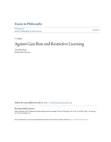 ABSTRACT: Arguments in favor of an individual moral right to keep and bear firearms typically appeal to the value of guns as a reasonable means of self-defense. This is, for the most part, an empirical claim. If it were shown that allowing private gun ownership would lead to an overall net increase in crime or other social harms, then the strength of a putative right to own a gun would be diminished. But would it be defeated completely? I do not think so, and indeed I want to suggest in this paper that even if the harms outweigh the benefits, that neither an outright ban on handguns nor restrictive discretionary ownership policies are justified as an initial reaction. In other words, given that the overall harms outweigh the overall benefits, the default position is still one in favor of reasonably permissive gun laws over a total ban or restrictive discretionary policies.
ABSTRACT: Arguments in favor of an individual moral right to keep and bear firearms typically appeal to the value of guns as a reasonable means of self-defense. This is, for the most part, an empirical claim. If it were shown that allowing private gun ownership would lead to an overall net increase in crime or other social harms, then the strength of a putative right to own a gun would be diminished. But would it be defeated completely? I do not think so, and indeed I want to suggest in this paper that even if the harms outweigh the benefits, that neither an outright ban on handguns nor restrictive discretionary ownership policies are justified as an initial reaction. In other words, given that the overall harms outweigh the overall benefits, the default position is still one in favor of reasonably permissive gun laws over a total ban or restrictive discretionary policies.
“In Defense of Eating Meat” Journal of Agricultural and Environmental Ethics 28:2 (2015): 277-291
 ABSTRACT: Some arguments for moral vegetarianism proceed by appealing to widely held beliefs about the immorality of causing unjustified pain. Combined with the claim that meat is not needed for our nourishment and that killing animals for this reason causes them unjustified pain, they yield the conclusion that eating meat is immoral. However, what counts as a good enough reason for causing pain will depend largely on what we think about the moral status of animals. Implicit in these arguments is the claim that sentience is sufficient for having moral status. These arguments, however, fail to specify the conceptual connection between the two. I argue in this paper that sentience is not sufficient for moral status. Thus, although animals experience pain as it is physically bad, their experience of it is not in itself morally bad. They are harmed in feeling pain, but this harm is not of a moral kind. This distinction parallels the more familiar distinction between moral and non-moral goods. When considered, this significantly mitigates the force of sentience-based arguments for moral vegetarianism. Since animals lack moral status, it is not wrong to eat meat, even if this is not essential to nutrition.
ABSTRACT: Some arguments for moral vegetarianism proceed by appealing to widely held beliefs about the immorality of causing unjustified pain. Combined with the claim that meat is not needed for our nourishment and that killing animals for this reason causes them unjustified pain, they yield the conclusion that eating meat is immoral. However, what counts as a good enough reason for causing pain will depend largely on what we think about the moral status of animals. Implicit in these arguments is the claim that sentience is sufficient for having moral status. These arguments, however, fail to specify the conceptual connection between the two. I argue in this paper that sentience is not sufficient for moral status. Thus, although animals experience pain as it is physically bad, their experience of it is not in itself morally bad. They are harmed in feeling pain, but this harm is not of a moral kind. This distinction parallels the more familiar distinction between moral and non-moral goods. When considered, this significantly mitigates the force of sentience-based arguments for moral vegetarianism. Since animals lack moral status, it is not wrong to eat meat, even if this is not essential to nutrition.
“The Moral Right to Keep and Bear Firearms“ coauthored with C’Zar Bernstein and Matthew Palumbo, Public Affairs Quarterly 29:4 (2015): 345-363
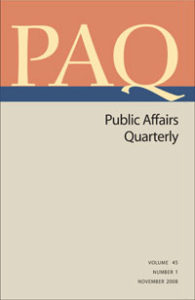 ABSTRACT: The moral right to keep and bear arms is entailed by the moral right of self-defense. We argue that the ownership and use of firearms is a reasonable means of exercising these rights. Given their defensive value, there is a strong presumption in favor of enacting civil rights to keep and bear arms ranging from handguns to ‘assault rifles.’ Thus, states are morally obliged as a matter of justice to recognize basic liberties for firearm ownership and usage. Throughout this paper we build upon the relevant criminological and social science research in addition to the work of other philosophers who have in recent years argued in favor of gun rights. Although we believe the statistical evidence supports our case, our argument is primarily non-consequentialist. We do, however, address consequentialist objections in the last section of this paper.
ABSTRACT: The moral right to keep and bear arms is entailed by the moral right of self-defense. We argue that the ownership and use of firearms is a reasonable means of exercising these rights. Given their defensive value, there is a strong presumption in favor of enacting civil rights to keep and bear arms ranging from handguns to ‘assault rifles.’ Thus, states are morally obliged as a matter of justice to recognize basic liberties for firearm ownership and usage. Throughout this paper we build upon the relevant criminological and social science research in addition to the work of other philosophers who have in recent years argued in favor of gun rights. Although we believe the statistical evidence supports our case, our argument is primarily non-consequentialist. We do, however, address consequentialist objections in the last section of this paper.
“A Defense of the Perverted Faculty Argument Against Homosexual Sex” The Heythrop Journal 56:5 (2015): 751-758
 ABSTRACT: Critics of homosexual activity often appeal to some form of natural law theory as a basis for their arguments. According to one version of natural law theory, actions that “pervert” or misuse a bodily faculty are immoral. In this paper, I argue that this “perverted faculty argument” provides a successful account of good and evil action. Several objections are assessed and found inadequate.
ABSTRACT: Critics of homosexual activity often appeal to some form of natural law theory as a basis for their arguments. According to one version of natural law theory, actions that “pervert” or misuse a bodily faculty are immoral. In this paper, I argue that this “perverted faculty argument” provides a successful account of good and evil action. Several objections are assessed and found inadequate.